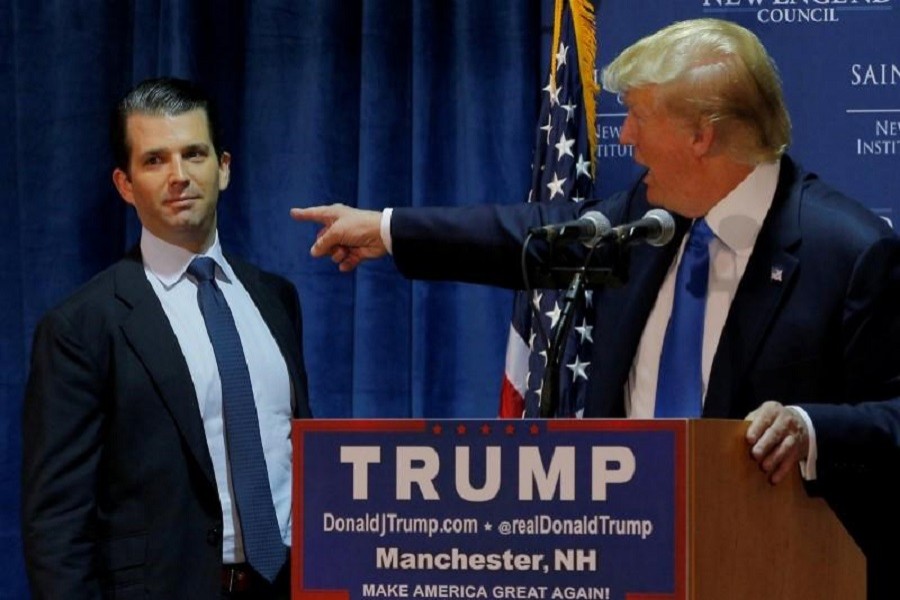President Donald Trump’s eldest son, Donald Trump Jr., declined to discuss with lawmakers on Wednesday a conversation he had with his father about emails related to a June 2016 meeting he attended with Trump associates and Russians, a congressional panel member said.
Representative Adam Schiff, the top Democrat on the US House of Representatives Intelligence Committee investigating allegations of Russian interference in last year’s US election, said Trump Jr. answered the “overwhelming majority” of questions from committee members in his hours of testimony.
But Trump Jr. claimed attorney-client privilege in declining to respond to queries about that discussion with his father because a lawyer was in the room when it took place. The discussion between then-Republican candidate Trump and his son took place after the emails became public, Schiff said. Trump Jr. released the emails in July.
“In my view there is no attorney-client privilege that protects a discussion between father and son,” Schiff told reporters after the closed-door testimony had ended.
“We will be following up with his counsel,” Schiff said.
Representative Mike Conaway, the Republican leading the investigation, said Trump Jr. had answered all of his questions.
“Mr Trump was cooperative at all times,” Conaway said.
Trump Jr. arrived and left without being seen by reporters.
Lawmakers said they want to question him about a meeting with a Russian lawyer in June 2016 at Trump Tower in New York at which he had said he hoped to get information about the “fitness, character and qualifications” of former Secretary of State Hillary Clinton, the Democrat who was his father’s presidential election opponent.
It was at least the second time Trump Jr. has testified to a congressional committee investigating any Russian meddling in the election and possible collusion with Moscow by the Trump campaign.
He arrived shortly before 10 a.m. EST (1500 GMT) and was questioned for most of the next eight hours by members of the intelligence panel.
A person familiar with knowledge of Trump Jr’s testimony said Trump had said repeatedly he did not remember things he was asked about, including some details about information provided by Russians during the Trump Tower meeting.
Department of Justice Special Counsel Robert Mueller is also investigating. He has announced the first charges of Trump associates, and Trump’s former national security adviser, Michael Flynn, has pleaded guilty to lying to Federal Bureau of Investigation agents.
The House intelligence panel also released on Wednesday a transcript of testimony last week of Erik Prince, a Trump supporter and founder of the Blackwater military contractor. A focus of that testimony was a report that Prince tried to set up a “back channel” for communications between Trump associates and Russia. Prince denied such a plan.
Republicans criticize probes
Trump Jr.’s appearance coincided with criticism of the Russia probes from some of his father’s fellow Republicans, who control both houses of Congress and accuse investigators of bias against Trump. Other lawmakers, Republicans as well as Democrats, say the goal of the investigations is to guarantee the integrity of US elections, not to target Trump and his associates.
Trump Jr., like his father, denies collusion with Russia. US intelligence agencies concluded that Russia attempted to influence the 2016 campaign to boost Trump’s chances of defeating Clinton. Moscow denies any such effort.
Some Republicans criticised Mueller, the FBI and the Department of Justice at a news conference on Wednesday, ahead of congressional testimony on Thursday by the director of the FBI, Christopher Wray.
Republican House members accused the Justice Department and the FBI of bias against the president and having been too easy on Clinton during the investigation of her use of a private email server while leading the State Department.
However, Clinton has made no secret of her belief that then-FBI Director James Comey’s announcement just before the election that the bureau was investigating potential new evidence in the lengthy email probe cost her the White House.
Also on Wednesday, Representative Bob Goodlatte, the Republican chairman of the House Judiciary Committee, announced a hearing next week with Deputy Attorney General Rod Rosenstein, citing “serious concerns” about reports on the political motives of staff on Mueller’s team.


